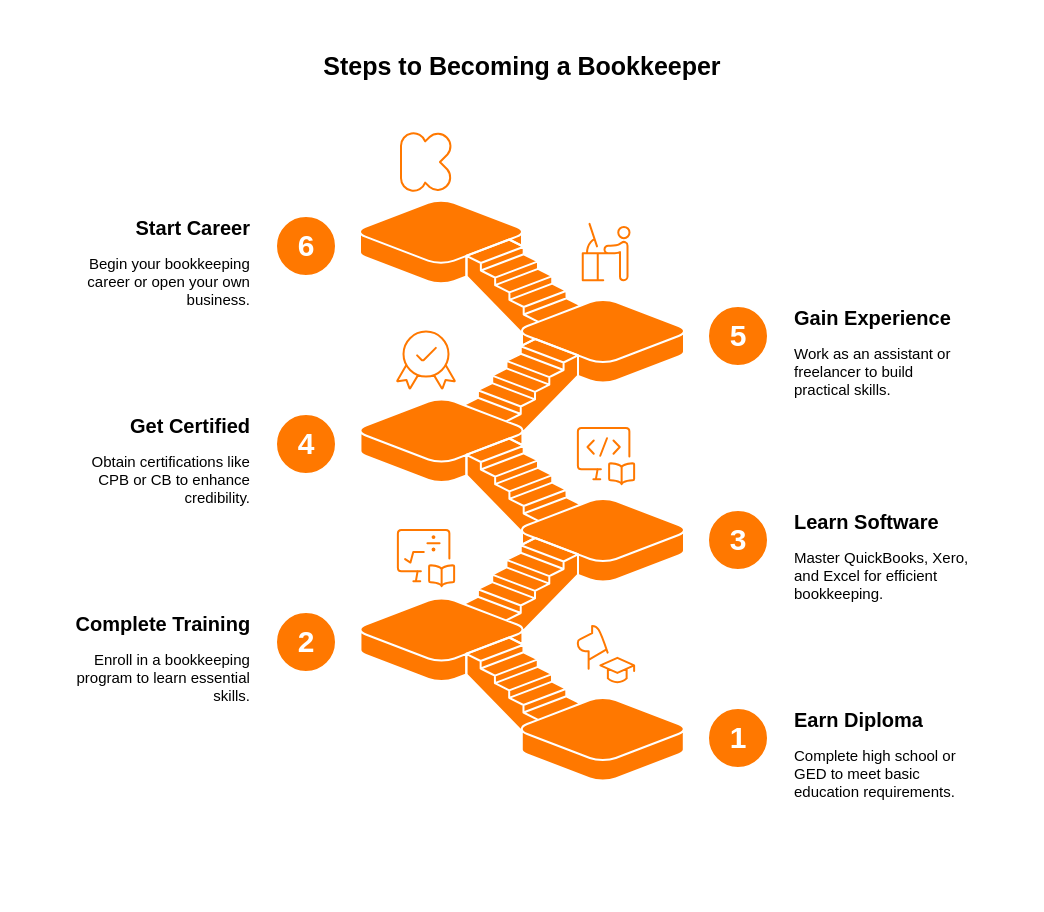How to Become a Bookkeeper
Want to become a bookkeeper? You can start in under a year through online courses or trade programs. This guide explains the steps, certifications, and career options — whether you’re starting fresh or upskilling for remote work.
If you’re organized, detail-oriented, and enjoy working with numbers, bookkeeping is one of the best entry-level business careers available in 2025.
What Does a Bookkeeper Do?
Bookkeepers record and organize financial transactions for businesses. They make sure the money coming in and out is properly tracked and documented.
Daily tasks include:
- Recording invoices and payments
- Managing payroll and employee expenses
- Reconciling bank statements
- Preparing balance sheets and financial reports
- Working with accountants during tax season
Bookkeepers keep businesses financially healthy and compliant — a critical role for every organization.
Remote work has made bookkeeping more flexible than ever — many professionals now work from home or run their own virtual bookkeeping business.
How to Become a Bookkeeper (6 Steps)
-
Earn a high school diploma or GED
Most employers require a minimum of high school education with strong math and computer skills. -
Complete a bookkeeping training program or associate degree
Trade schools and community colleges offer short, career-focused courses that teach QuickBooks, Excel, and accounting fundamentals.
Bookkeeping Training Programs
-
Learn key software
Proficiency with QuickBooks, Xero, and Microsoft Excel is essential. -
Get certified (optional but valuable)
Certifications like CPB (Certified Professional Bookkeeper) or CB (Certified Bookkeeper) can help you stand out and boost earnings. -
Gain experience
Start as an assistant, intern, or freelancer to build real-world skills. -
Start your career or open your own business
Many bookkeepers eventually freelance or run their own bookkeeping firms.
Popular Bookkeeper Certifications
| Certification | Issued By | Description |
|---|---|---|
| Certified Bookkeeper (CB) | American Institute of Professional Bookkeepers (AIPB) | Recognized national certification for bookkeepers. |
| Certified Professional Bookkeeper (CPB) | National Association of Certified Public Bookkeepers (NACPB) | Ideal for small business and online bookkeeping. |
| QuickBooks ProAdvisor | Intuit | Focuses on QuickBooks Online software mastery. |
Certification is optional but signals expertise — especially useful for freelancers and small-business specialists.
Skills That Make Great Bookkeepers
- Strong attention to detail
- Organization and time management
- Data entry accuracy
- Understanding of accounting principles
- Tech skills (Excel, QuickBooks, cloud systems)
- Communication and confidentiality
The best bookkeepers blend analytical thinking with reliability — they’re trusted partners to business owners.
Pros & Cons of the Bookkeeping Career
Pros:
- Quick path (6–12 months) into a stable career
- Flexible work — in-office, remote, or freelance
- Growing demand for small-business and online bookkeeping
- Clear career ladder into accounting or finance
Cons:
- Repetitive tasks can become routine
- Deadlines during tax season
- Need to stay updated on software and tax rules
Start Your Bookkeeping Career
Bookkeeping offers a practical, affordable entry into the world of business and finance — no degree required.
Find a bookkeeping program near you and start building your financial skills today.

Bookkeeper Salary by State

Meet the author: Brad Fishbein is a Florida Licensed Mold Assessor and council-certified Microbial Investigator. He’s the founder of TradeCareerPath.com and has completed over 5,000 mold inspections since 2009. Brad now helps homeowners and tradespeople make smart decisions about mold, licensing, and skilled career paths.
Notice an update we should make?
We strive for accuracy. Contact us here if you see incorrect or outdated info on this page.